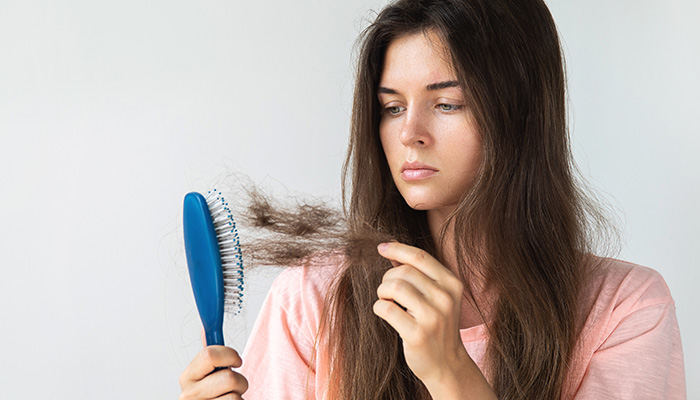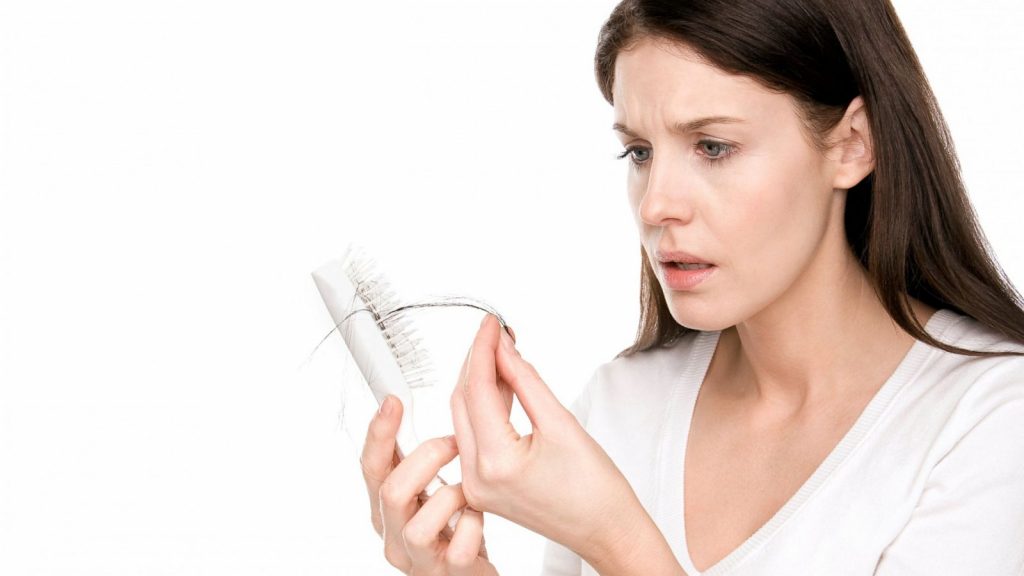
Losing some hair every day is completely natural. But when you’re losing a lot of hair, it can be difficult to figure out what’s causing that hair loss—especially in women. Most of the time minor hair loss is just a sign that your body’s growing new, healthy ones to replace the old. In fact, losing up to 100 hairs per day is totally normal. If you’re not sure what’s normal for you, it’s a good idea to simply pay attention to what you typically see in your brush or shower drain. And “if all of a sudden you’re noticing a lot more, or your ponytail is thinner or you’re seeing more scalp,” then you may be losing more hair than you should.
Figuring out why you’re suddenly losing more hair than usual can be tricky because there are many different causes of hair loss in women. Some, like hereditary hair loss, aren’t really in your control—you get the hand you’re dealt. But others, like traction alopecia or temporary hair shedding, can be managed or even reversed if caught early. Making things even more complicated, some causes of hair loss in women result in sudden shedding while others may become progressively more noticeable over time. If you’ve noticed your hair is falling out more than usual, looks thinner, or seems to be growing more slowly, here are some of the most common reasons for hair loss in women.

Hereditary hair loss
Both men and women develop this type of hair loss, which is the most common cause of hair loss worldwide. In men, it’s called male pattern hair loss. Women get female pattern hair loss. Regardless of whether it develops in a man or women, the medical term is androgenic alopecia. No matter which term you use, it means that you’ve inherited genes that cause your hair follicles to shrink and eventually stop growing hair. Shrinking can begin as early as your teens, but it usually starts later in life. In women, the first noticeable sign of hereditary hair loss is usually overall thinning or a widening part. When a man has hereditary hair loss, the first sign is often a receding hairline or bald spot at the top of his head.

Nutritional deficiencies
Creating and maintaining healthy hair relies on getting solid nutrition. In particular, deficiencies in iron, zinc, vitamin B3, and protein have all been linked to various types of hair loss. Treating a nutritional deficiency usually starts with a chat with your doctor and a blood test to accurately diagnose your issue. Then your doctor may treat your deficiency with prescription supplements or may refer you to an R.D. for further guidance.

Medications
Some medications can cause chronic shedding. In particular, those used to manage high blood pressure, cancer, arthritis, and depression are known to cause hair loss issues. If you think your medication may be causing hair loss, check in with your doctor. In many cases, this type of hair loss is temporary. But if your hair loss becomes chronic, your doctor may be able to prescribe a different medication that doesn’t cause this side effect.

Alopecia areata
Alopecia areata is a disease that develops when the body’s immune system attacks hair follicles (what holds the hair in place), causing hair loss. You can lose hair anywhere on your body, including your scalp, inside your nose, and in your ears. Some people lose their eyelashes or eyebrows.

Childbirth, illness, or other stressors
A few months after giving birth, recovering from an illness, or having an operation, you may notice a lot more hairs in your brush or on your pillow. This can also happen after a stressful time in your life, such as a divorce or death of a loved one.
[“source=strath”]
